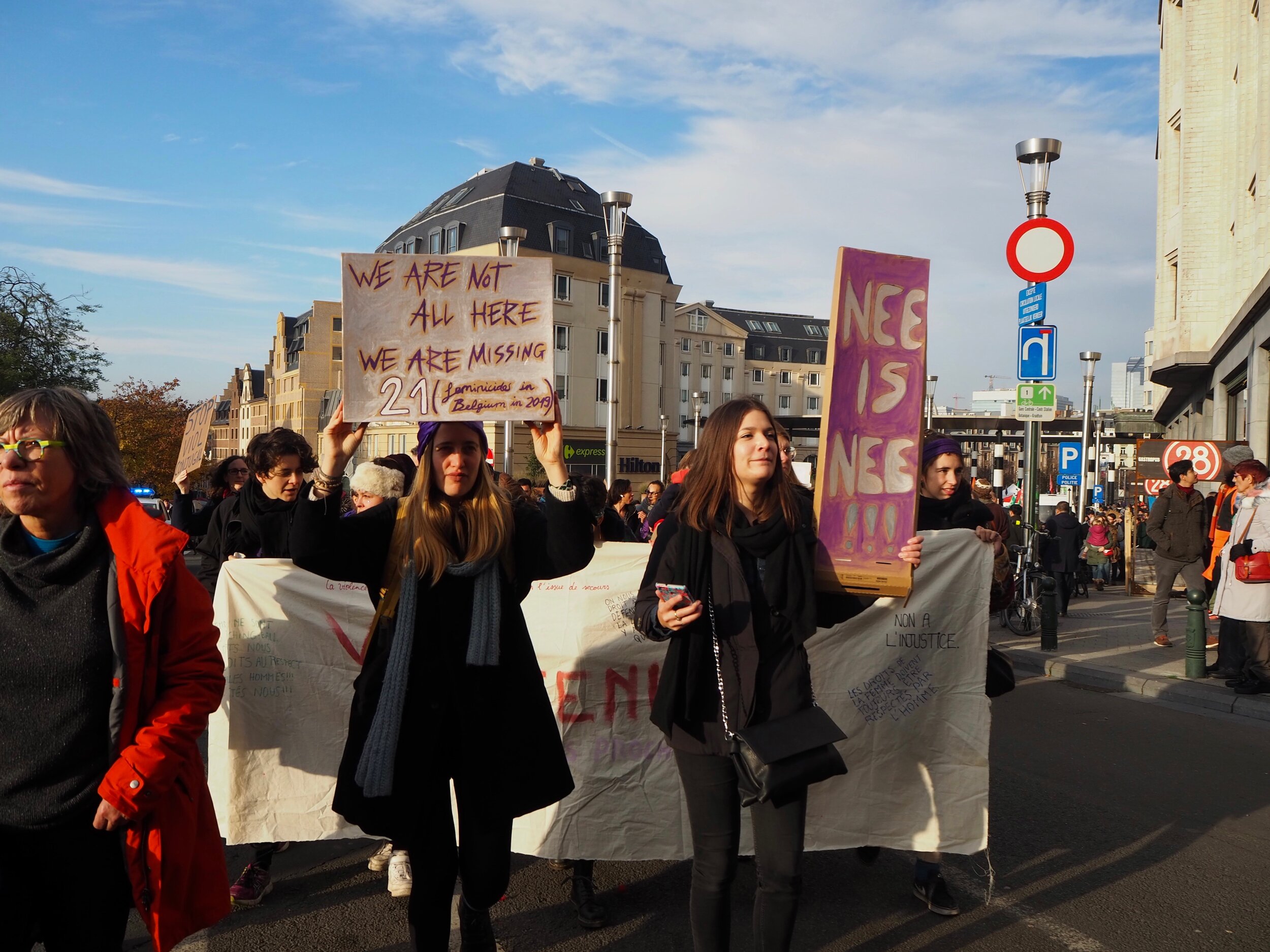“You Don’t Kill Out of Love”
Lola Massinon and Juliette Chalant Devlesaver
Marielle T., Jill H., Aurélie M., Lesley, Lutgarde M., Ellen D., Leila k., Sally H., Mia T., Isabelle R., Karine I., Barbara O., Julie V., Eliane G., Céline D., Dominique V., Sabrina, Nancy M., Jessica C., Fatima, Valentine D., Elodie D., and Daniëlle V.
In 2016, Belgium signed the Istanbul Convention (also known as The Council of Europe Convention on preventing and combating violence against women and domestic violence). It recognises violence against women as a human rights violation. The convention represents a comprehensive legal framework that outlines minimum standards for a state's response to violence against women and girls:
“The Council of Europe’s Istanbul Convention addresses all forms of violence against women, including domestic violence, through measures aimed at preventing violence, protecting victims, and prosecuting the perpetrators.”
The Belgian state is not living up to these promises. In 2019, there were 23 feminicides in Belgium, meaning there has been an average of one feminicide every 16 days. There are approximately 45,000 cases of domestic violence per year in Belgium, equivalent to 120 per day.
In English, the term femicide and feminicide are seen as interchangeable, but in French, feminicide (translated from the word feminicido) is slightly different. Both describe the gendered aspect of murder - the murder of women because they are women.
Originating in Latin America in the 1990s after hundreds of women disappeared in Ciudad Juarez, Mexico, feminicide emphasizes the structural violence against women and the fact that "it is a gender-based, misogynistic crime of hatred against women that enjoys great social tolerance.” The term “féminicide” was included in the Petit Robert dictionary in 2015, but some organisations such as the World Health Organization (WHO) still use “femicide” (even in French). In the last couple of years, “Feminicide” has become an increasingly popular term used by the media.
On November 24, 2019, 10,000 people took to the streets of Brussels to raise their voices in a march protesting violence against women, organised by the Mirabal collective and other organisations. A day full of enthusiastic energy, cohesion and anger, more people turned up than ever before to take a stand against discriminatory, institutionalised and systemic violence.
The mission of those who mobilised on November 24 was to denounce the failure of the Belgian government in implementing coordinated measures to prevent violence, protect victims and prosecute perpetrators. No real prevention policy exists. Victims are encouraged to talk about their experiences, but nothing is being done to substantially improve their safety or support domestically, in police stations or in the public sphere.
The recognition of violence by institutions (health, police, justice, administrations, employers, etc.) is not guaranteed. Monitoring criminal records to ensure accountability of perpetrators remains minimal. Feminist associations and specialised services have to manage with scant resources and limited funds. The very survival of organisations active in the fight against violence are currently threatened by recent restrictions of federal subsidies and serious risks to the sustainability of subsidies in the Flemish region.
Violence is never just physical violence. More often than not, violence is tied to psychological, sexual, social, institutional, economic, racist, homophobic, transphobic, islamophobic, and fatphobic underpinnings.
In the media, feminicides are described using terms such as “family tragedies” and “crimes of passion,” a long-standing tradition of euphemising domestic violence. Relegating these facts back to the private sphere trivialises them and minimises their impact, their consequences, their significance. Above all, these terms support institutional inaction and the relegation of women to a perpetual state of danger.
Bio
Lola is a 21-year-old Sociology student from Belgium. On November 24, 2019, she took to the streets with her sisters at Brussels’ March on Violence Against Women in retaliation against the patriarchy. Lola photographed the march to help feminist collective Collecti.e.f 8 maars make the demonstration visible to the general public. Her photos document Belgium’s current feminist wave, capturing its beautiful energy.
Juliette is Communications Director at the jfa (@jfa_mag).
The only website that tracks the numbers of feminicides in Belgium: http://stopfeminicide.blogspot.com/p/violences-machistes.html
This photo essay’s title is derived from a sign observed at the November 2019 march. It relates to the fact that femicides are divided into several categories, one of them being “intimate partner femicides” or “romantic femicide,” pointing to the notion that we continue to treat femicides and feminicides as crimes of the private sphere - ‘crimes of passion’ - and not as what they truly are: gender-based structural violence.
















